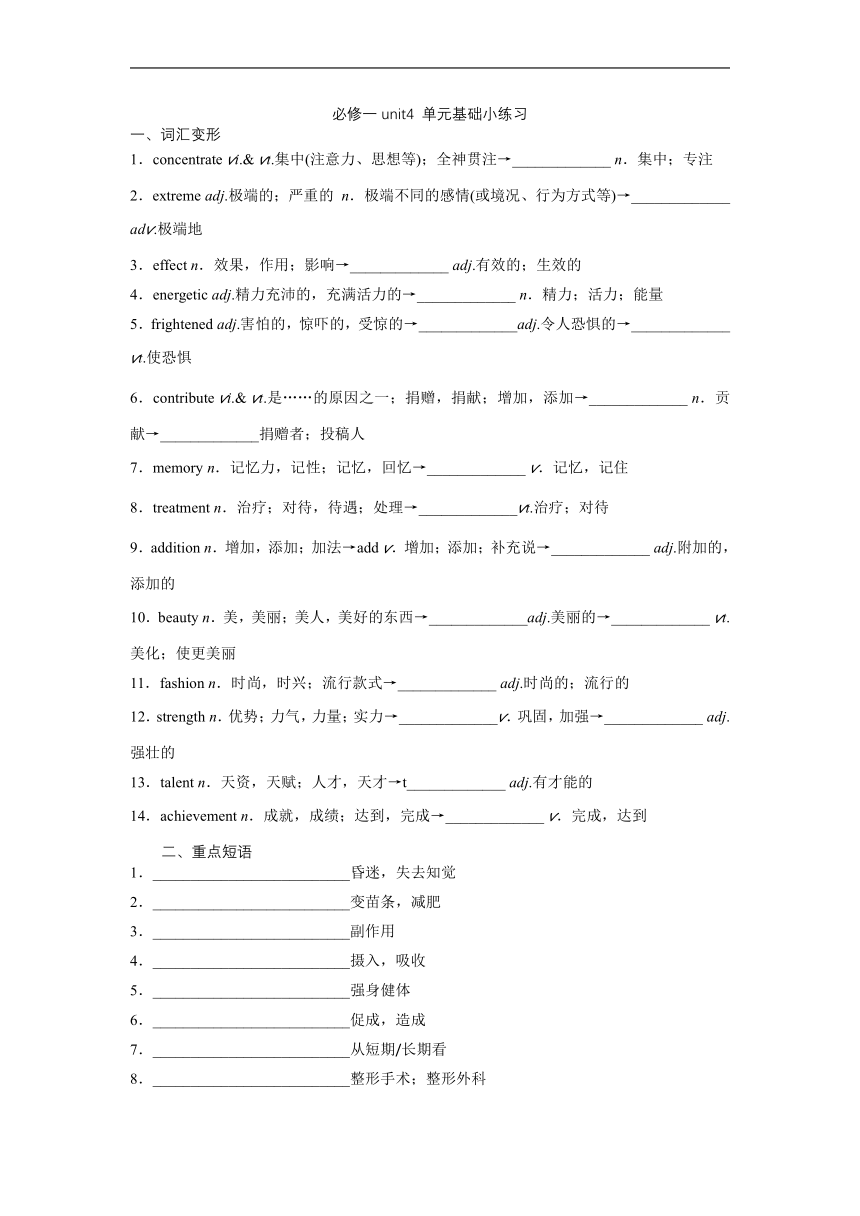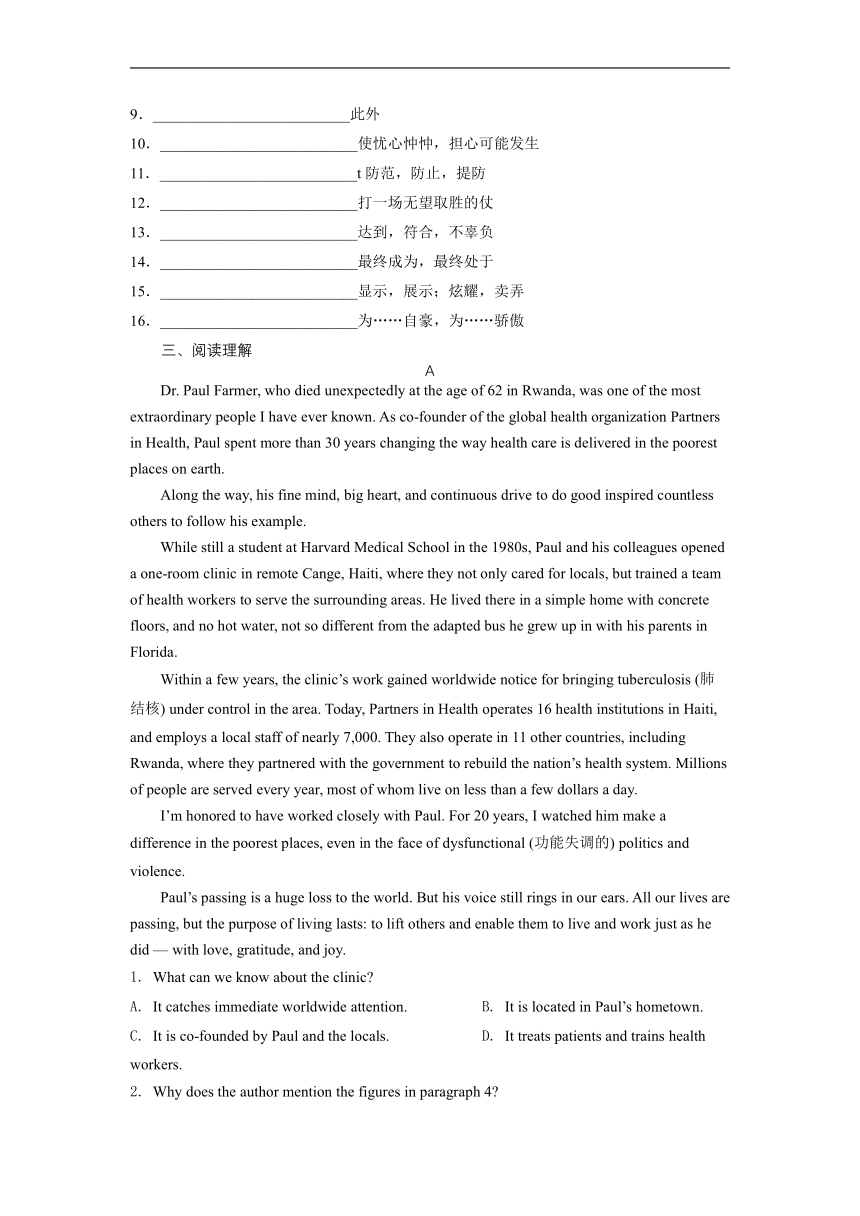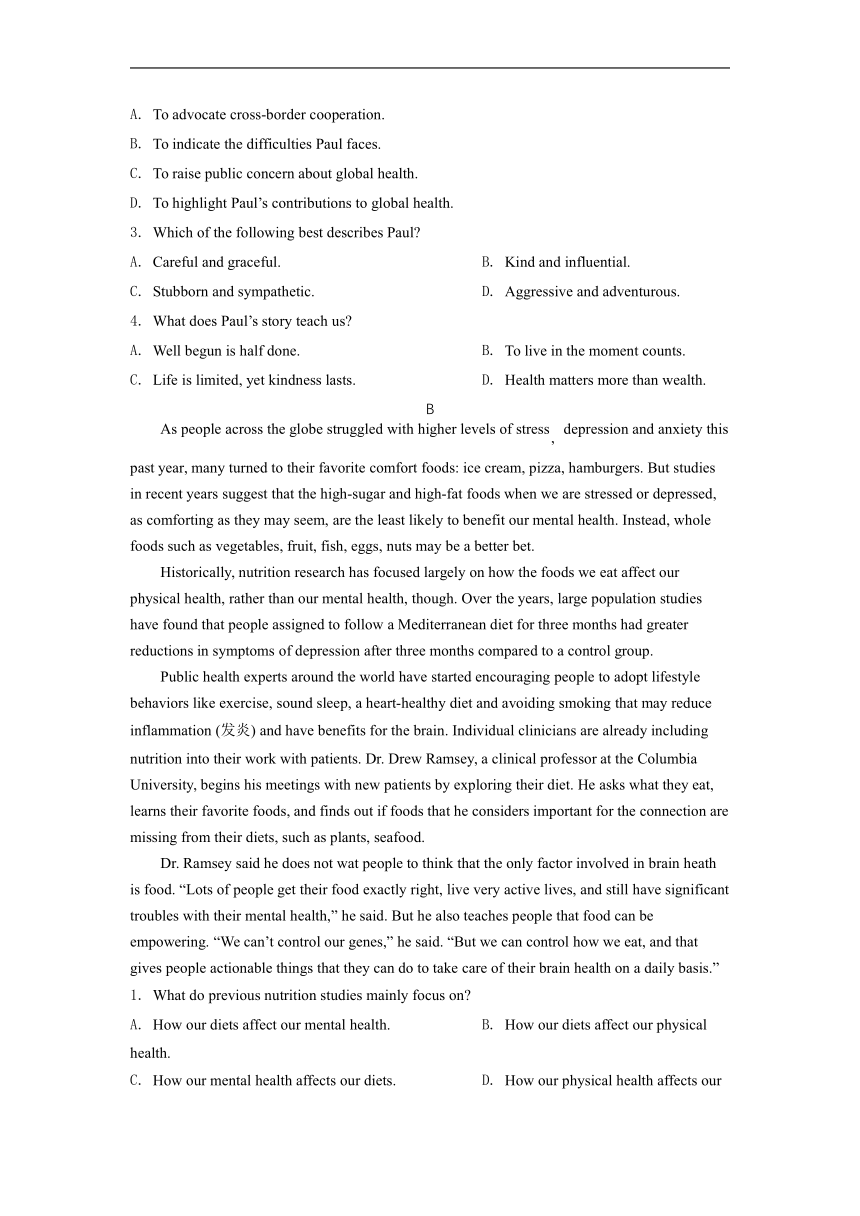牛津译林版(2019) 必修 第一册 Unit 4 Looking good, feeling good 单元基础小练习(word版含答案)
文档属性
| 名称 | 牛津译林版(2019) 必修 第一册 Unit 4 Looking good, feeling good 单元基础小练习(word版含答案) |

|
|
| 格式 | docx | ||
| 文件大小 | 22.9KB | ||
| 资源类型 | 教案 | ||
| 版本资源 | 牛津译林版(2019) | ||
| 科目 | 英语 | ||
| 更新时间 | 2022-10-08 00:00:00 | ||
图片预览



文档简介
必修一unit4 单元基础小练习
一、词汇变形
1.concentrate vi.& vt.集中(注意力、思想等);全神贯注→_____________ n.集中;专注
2.extreme adj.极端的;严重的 n.极端不同的感情(或境况、行为方式等)→_____________ adv.极端地
3.effect n.效果,作用;影响→_____________ adj.有效的;生效的
4.energetic adj.精力充沛的,充满活力的→_____________ n.精力;活力;能量
5.frightened adj.害怕的,惊吓的,受惊的→_____________adj.令人恐惧的→_____________ vt.使恐惧
6.contribute vi.& vt.是……的原因之一;捐赠,捐献;增加,添加→_____________ n.贡献→_____________捐赠者;投稿人
7.memory n.记忆力,记性;记忆,回忆→_____________ v.记忆,记住
8.treatment n.治疗;对待,待遇;处理→_____________vt.治疗;对待
9.addition n.增加,添加;加法→add v.增加;添加;补充说→_____________ adj.附加的,添加的
10.beauty n.美,美丽;美人,美好的东西→_____________adj.美丽的→_____________ vt.美化;使更美丽
11.fashion n.时尚,时兴;流行款式→_____________ adj.时尚的;流行的
12.strength n.优势;力气,力量;实力→_____________v.巩固,加强→_____________ adj.强壮的
13.talent n.天资,天赋;人才,天才→t_____________ adj.有才能的
14.achievement n.成就,成绩;达到,完成→_____________ v.完成,达到
二、重点短语
1.__________________________昏迷,失去知觉
2.__________________________变苗条,减肥
3.__________________________副作用
4.__________________________摄入,吸收
5.__________________________强身健体
6.__________________________促成,造成
7.__________________________从短期/长期看
8.__________________________整形手术;整形外科
9.__________________________此外
10.__________________________使忧心忡忡,担心可能发生
11.__________________________t防范,防止,提防
12.__________________________打一场无望取胜的仗
13.__________________________达到,符合,不辜负
14.__________________________最终成为,最终处于
15.__________________________显示,展示;炫耀,卖弄
16.__________________________为……自豪,为……骄傲
三、阅读理解
A
Dr. Paul Farmer, who died unexpectedly at the age of 62 in Rwanda, was one of the most extraordinary people I have ever known. As co-founder of the global health organization Partners in Health, Paul spent more than 30 years changing the way health care is delivered in the poorest places on earth.
Along the way, his fine mind, big heart, and continuous drive to do good inspired countless others to follow his example.
While still a student at Harvard Medical School in the 1980s, Paul and his colleagues opened a one-room clinic in remote Cange, Haiti, where they not only cared for locals, but trained a team of health workers to serve the surrounding areas. He lived there in a simple home with concrete floors, and no hot water, not so different from the adapted bus he grew up in with his parents in Florida.
Within a few years, the clinic’s work gained worldwide notice for bringing tuberculosis (肺结核) under control in the area. Today, Partners in Health operates 16 health institutions in Haiti, and employs a local staff of nearly 7,000. They also operate in 11 other countries, including Rwanda, where they partnered with the government to rebuild the nation’s health system. Millions of people are served every year, most of whom live on less than a few dollars a day.
I’m honored to have worked closely with Paul. For 20 years, I watched him make a difference in the poorest places, even in the face of dysfunctional (功能失调的) politics and violence.
Paul’s passing is a huge loss to the world. But his voice still rings in our ears. All our lives are passing, but the purpose of living lasts: to lift others and enable them to live and work just as he did — with love, gratitude, and joy.
1. What can we know about the clinic
A. It catches immediate worldwide attention. B. It is located in Paul’s hometown.
C. It is co-founded by Paul and the locals. D. It treats patients and trains health workers.
2. Why does the author mention the figures in paragraph 4
A. To advocate cross-border cooperation.
B. To indicate the difficulties Paul faces.
C. To raise public concern about global health.
D. To highlight Paul’s contributions to global health.
3. Which of the following best describes Paul
A. Careful and graceful. B. Kind and influential.
C. Stubborn and sympathetic. D. Aggressive and adventurous.
4. What does Paul’s story teach us
A. Well begun is half done. B. To live in the moment counts.
C. Life is limited, yet kindness lasts. D. Health matters more than wealth.
B
As people across the globe struggled with higher levels of stress depression and anxiety this past year, many turned to their favorite comfort foods: ice cream, pizza, hamburgers. But studies in recent years suggest that the high-sugar and high-fat foods when we are stressed or depressed, as comforting as they may seem, are the least likely to benefit our mental health. Instead, whole foods such as vegetables, fruit, fish, eggs, nuts may be a better bet.
Historically, nutrition research has focused largely on how the foods we eat affect our physical health, rather than our mental health, though. Over the years, large population studies have found that people assigned to follow a Mediterranean diet for three months had greater reductions in symptoms of depression after three months compared to a control group.
Public health experts around the world have started encouraging people to adopt lifestyle behaviors like exercise, sound sleep, a heart-healthy diet and avoiding smoking that may reduce inflammation (发炎) and have benefits for the brain. Individual clinicians are already including nutrition into their work with patients. Dr. Drew Ramsey, a clinical professor at the Columbia University, begins his meetings with new patients by exploring their diet. He asks what they eat, learns their favorite foods, and finds out if foods that he considers important for the connection are missing from their diets, such as plants, seafood.
Dr. Ramsey said he does not wat people to think that the only factor involved in brain heath is food. “Lots of people get their food exactly right, live very active lives, and still have significant troubles with their mental health,” he said. But he also teaches people that food can be empowering. “We can’t control our genes,” he said. “But we can control how we eat, and that gives people actionable things that they can do to take care of their brain health on a daily basis.”
1. What do previous nutrition studies mainly focus on
A. How our diets affect our mental health. B. How our diets affect our physical health.
C. How our mental health affects our diets. D. How our physical health affects our diets.
2. Why are individual clinicians including nutrition into their work with patients
A. They try to cater to their patients’ needs.
B. They are questioning public health experts.
C. They want to prove the effectiveness of healthy diets.
D. They have accepted the findings of large population studies.
3. Which of the following might Dr. Ramsey agree with
A. Some connection exists between our diets and mental health.
B. People can control their genes as well as how they eat.
C. People living active lives will not have mental problems.
D. Eating a healthy diet is going to cure depression.
4. What is the main idea of the text
A. People with anxiety usually turn to food for comfort.
B. The daily diet is the factor connected with brain health.
C. Controlling the way we eat is likely to benefit our mental health.
D. Having a high-sugar diet can reduce symptoms of depression.
三、写作:
你校将举办英语演讲比赛。请你以Be smart online learners为题写一篇发言稿参赛,内容包括:
1. 分析优势与不足;
2. 提出学习建议。
注意:
1. 词数100左右;
2. 题目和首句已为你写好。
____________________________________________________________________________________________________________________________________________________________________________________________________________________________________________________________________________________________________________________________________________________________________________________________________________________________________________________________________________________________________________________________________________________________________________________________________________________________________________________________________
词汇
1.concentrate vi.& vt.集中(注意力、思想等);全神贯注→concentration n.集中;专注
2.extreme adj.极端的;严重的 n.极端不同的感情(或境况、行为方式等)→extremely adv.极端地
3.effect n.效果,作用;影响→effective adj.有效的;生效的
4.energetic adj.精力充沛的,充满活力的→energy n.精力;活力;能量
5.frightened adj.害怕的,惊吓的,受惊的→frightening adj.令人恐惧的→frighten vt.使恐惧
6.contribute vi.& vt.是……的原因之一;捐赠,捐献;增加,添加→contribution n.贡献→contributor捐赠者;投稿人
7.memory n.记忆力,记性;记忆,回忆→memorize v.记忆,记住
8.treatment n.治疗;对待,待遇;处理→treat vt.治疗;对待
9.addition n.增加,添加;加法→add v.增加;添加;补充说→additional adj.附加的,添加的
10.beauty n.美,美丽;美人,美好的东西→beautiful adj.美丽的→beautify vt.美化;使更美丽
11.fashion n.时尚,时兴;流行款式→fashionable adj.时尚的;流行的
12.strength n.优势;力气,力量;实力→strengthen v.巩固,加强→strong adj.强壮的
13.talent n.天资,天赋;人才,天才→talented adj.有才能的
14.achievement n.成就,成绩;达到,完成→achieve v.完成,达到
重要短语
1.pass out昏迷,失去知觉
2.slim down变苗条,减肥
3.side effect副作用
4.take in摄入,吸收
5.get into shape强身健体
6.contribute to促成,造成
7.in the short/long term从短期/长期看
8.plastic surgery整形手术;整形外科
9.in addition此外
10.hang over使忧心忡忡,担心可能发生
11.guard against防范,防止,提防
12.fight a losing battle打一场无望取胜的仗
13.live up to达到,符合,不辜负
14.end up最终成为,最终处于
15.show off显示,展示;炫耀,卖弄
16.take pride in为……自豪,为……骄傲
阅读
A篇【答案】1. D 2. D 3. B 4. C
B篇【答案1. B 2. D 3. A 4. C
写作
Be smart online learners
Network learning has increasingly become an important means for people to acquire knowledge and solve problems.But being smart online learners has its advantages and disadvantages.
First of all, as smart online learners, we can make full use of the most extensive educational resources to broaden the horizon. Besides, We can take the initiative in our study by ourselves without time and space limit.
Of course, these disadvantages are as follows.Faced with all kinds of information on the internet, We can't tell the difference between the true and the false, which may be harmful to our study and life. On the other hand, online learning itself has some imperfections, making it difficult for us not to be affected.
In conclusion , we should have a good understanding of its advantages and disadvantages and find a proper way to make our study more efficient.
一、词汇变形
1.concentrate vi.& vt.集中(注意力、思想等);全神贯注→_____________ n.集中;专注
2.extreme adj.极端的;严重的 n.极端不同的感情(或境况、行为方式等)→_____________ adv.极端地
3.effect n.效果,作用;影响→_____________ adj.有效的;生效的
4.energetic adj.精力充沛的,充满活力的→_____________ n.精力;活力;能量
5.frightened adj.害怕的,惊吓的,受惊的→_____________adj.令人恐惧的→_____________ vt.使恐惧
6.contribute vi.& vt.是……的原因之一;捐赠,捐献;增加,添加→_____________ n.贡献→_____________捐赠者;投稿人
7.memory n.记忆力,记性;记忆,回忆→_____________ v.记忆,记住
8.treatment n.治疗;对待,待遇;处理→_____________vt.治疗;对待
9.addition n.增加,添加;加法→add v.增加;添加;补充说→_____________ adj.附加的,添加的
10.beauty n.美,美丽;美人,美好的东西→_____________adj.美丽的→_____________ vt.美化;使更美丽
11.fashion n.时尚,时兴;流行款式→_____________ adj.时尚的;流行的
12.strength n.优势;力气,力量;实力→_____________v.巩固,加强→_____________ adj.强壮的
13.talent n.天资,天赋;人才,天才→t_____________ adj.有才能的
14.achievement n.成就,成绩;达到,完成→_____________ v.完成,达到
二、重点短语
1.__________________________昏迷,失去知觉
2.__________________________变苗条,减肥
3.__________________________副作用
4.__________________________摄入,吸收
5.__________________________强身健体
6.__________________________促成,造成
7.__________________________从短期/长期看
8.__________________________整形手术;整形外科
9.__________________________此外
10.__________________________使忧心忡忡,担心可能发生
11.__________________________t防范,防止,提防
12.__________________________打一场无望取胜的仗
13.__________________________达到,符合,不辜负
14.__________________________最终成为,最终处于
15.__________________________显示,展示;炫耀,卖弄
16.__________________________为……自豪,为……骄傲
三、阅读理解
A
Dr. Paul Farmer, who died unexpectedly at the age of 62 in Rwanda, was one of the most extraordinary people I have ever known. As co-founder of the global health organization Partners in Health, Paul spent more than 30 years changing the way health care is delivered in the poorest places on earth.
Along the way, his fine mind, big heart, and continuous drive to do good inspired countless others to follow his example.
While still a student at Harvard Medical School in the 1980s, Paul and his colleagues opened a one-room clinic in remote Cange, Haiti, where they not only cared for locals, but trained a team of health workers to serve the surrounding areas. He lived there in a simple home with concrete floors, and no hot water, not so different from the adapted bus he grew up in with his parents in Florida.
Within a few years, the clinic’s work gained worldwide notice for bringing tuberculosis (肺结核) under control in the area. Today, Partners in Health operates 16 health institutions in Haiti, and employs a local staff of nearly 7,000. They also operate in 11 other countries, including Rwanda, where they partnered with the government to rebuild the nation’s health system. Millions of people are served every year, most of whom live on less than a few dollars a day.
I’m honored to have worked closely with Paul. For 20 years, I watched him make a difference in the poorest places, even in the face of dysfunctional (功能失调的) politics and violence.
Paul’s passing is a huge loss to the world. But his voice still rings in our ears. All our lives are passing, but the purpose of living lasts: to lift others and enable them to live and work just as he did — with love, gratitude, and joy.
1. What can we know about the clinic
A. It catches immediate worldwide attention. B. It is located in Paul’s hometown.
C. It is co-founded by Paul and the locals. D. It treats patients and trains health workers.
2. Why does the author mention the figures in paragraph 4
A. To advocate cross-border cooperation.
B. To indicate the difficulties Paul faces.
C. To raise public concern about global health.
D. To highlight Paul’s contributions to global health.
3. Which of the following best describes Paul
A. Careful and graceful. B. Kind and influential.
C. Stubborn and sympathetic. D. Aggressive and adventurous.
4. What does Paul’s story teach us
A. Well begun is half done. B. To live in the moment counts.
C. Life is limited, yet kindness lasts. D. Health matters more than wealth.
B
As people across the globe struggled with higher levels of stress depression and anxiety this past year, many turned to their favorite comfort foods: ice cream, pizza, hamburgers. But studies in recent years suggest that the high-sugar and high-fat foods when we are stressed or depressed, as comforting as they may seem, are the least likely to benefit our mental health. Instead, whole foods such as vegetables, fruit, fish, eggs, nuts may be a better bet.
Historically, nutrition research has focused largely on how the foods we eat affect our physical health, rather than our mental health, though. Over the years, large population studies have found that people assigned to follow a Mediterranean diet for three months had greater reductions in symptoms of depression after three months compared to a control group.
Public health experts around the world have started encouraging people to adopt lifestyle behaviors like exercise, sound sleep, a heart-healthy diet and avoiding smoking that may reduce inflammation (发炎) and have benefits for the brain. Individual clinicians are already including nutrition into their work with patients. Dr. Drew Ramsey, a clinical professor at the Columbia University, begins his meetings with new patients by exploring their diet. He asks what they eat, learns their favorite foods, and finds out if foods that he considers important for the connection are missing from their diets, such as plants, seafood.
Dr. Ramsey said he does not wat people to think that the only factor involved in brain heath is food. “Lots of people get their food exactly right, live very active lives, and still have significant troubles with their mental health,” he said. But he also teaches people that food can be empowering. “We can’t control our genes,” he said. “But we can control how we eat, and that gives people actionable things that they can do to take care of their brain health on a daily basis.”
1. What do previous nutrition studies mainly focus on
A. How our diets affect our mental health. B. How our diets affect our physical health.
C. How our mental health affects our diets. D. How our physical health affects our diets.
2. Why are individual clinicians including nutrition into their work with patients
A. They try to cater to their patients’ needs.
B. They are questioning public health experts.
C. They want to prove the effectiveness of healthy diets.
D. They have accepted the findings of large population studies.
3. Which of the following might Dr. Ramsey agree with
A. Some connection exists between our diets and mental health.
B. People can control their genes as well as how they eat.
C. People living active lives will not have mental problems.
D. Eating a healthy diet is going to cure depression.
4. What is the main idea of the text
A. People with anxiety usually turn to food for comfort.
B. The daily diet is the factor connected with brain health.
C. Controlling the way we eat is likely to benefit our mental health.
D. Having a high-sugar diet can reduce symptoms of depression.
三、写作:
你校将举办英语演讲比赛。请你以Be smart online learners为题写一篇发言稿参赛,内容包括:
1. 分析优势与不足;
2. 提出学习建议。
注意:
1. 词数100左右;
2. 题目和首句已为你写好。
____________________________________________________________________________________________________________________________________________________________________________________________________________________________________________________________________________________________________________________________________________________________________________________________________________________________________________________________________________________________________________________________________________________________________________________________________________________________________________________________________
词汇
1.concentrate vi.& vt.集中(注意力、思想等);全神贯注→concentration n.集中;专注
2.extreme adj.极端的;严重的 n.极端不同的感情(或境况、行为方式等)→extremely adv.极端地
3.effect n.效果,作用;影响→effective adj.有效的;生效的
4.energetic adj.精力充沛的,充满活力的→energy n.精力;活力;能量
5.frightened adj.害怕的,惊吓的,受惊的→frightening adj.令人恐惧的→frighten vt.使恐惧
6.contribute vi.& vt.是……的原因之一;捐赠,捐献;增加,添加→contribution n.贡献→contributor捐赠者;投稿人
7.memory n.记忆力,记性;记忆,回忆→memorize v.记忆,记住
8.treatment n.治疗;对待,待遇;处理→treat vt.治疗;对待
9.addition n.增加,添加;加法→add v.增加;添加;补充说→additional adj.附加的,添加的
10.beauty n.美,美丽;美人,美好的东西→beautiful adj.美丽的→beautify vt.美化;使更美丽
11.fashion n.时尚,时兴;流行款式→fashionable adj.时尚的;流行的
12.strength n.优势;力气,力量;实力→strengthen v.巩固,加强→strong adj.强壮的
13.talent n.天资,天赋;人才,天才→talented adj.有才能的
14.achievement n.成就,成绩;达到,完成→achieve v.完成,达到
重要短语
1.pass out昏迷,失去知觉
2.slim down变苗条,减肥
3.side effect副作用
4.take in摄入,吸收
5.get into shape强身健体
6.contribute to促成,造成
7.in the short/long term从短期/长期看
8.plastic surgery整形手术;整形外科
9.in addition此外
10.hang over使忧心忡忡,担心可能发生
11.guard against防范,防止,提防
12.fight a losing battle打一场无望取胜的仗
13.live up to达到,符合,不辜负
14.end up最终成为,最终处于
15.show off显示,展示;炫耀,卖弄
16.take pride in为……自豪,为……骄傲
阅读
A篇【答案】1. D 2. D 3. B 4. C
B篇【答案1. B 2. D 3. A 4. C
写作
Be smart online learners
Network learning has increasingly become an important means for people to acquire knowledge and solve problems.But being smart online learners has its advantages and disadvantages.
First of all, as smart online learners, we can make full use of the most extensive educational resources to broaden the horizon. Besides, We can take the initiative in our study by ourselves without time and space limit.
Of course, these disadvantages are as follows.Faced with all kinds of information on the internet, We can't tell the difference between the true and the false, which may be harmful to our study and life. On the other hand, online learning itself has some imperfections, making it difficult for us not to be affected.
In conclusion , we should have a good understanding of its advantages and disadvantages and find a proper way to make our study more efficient.
